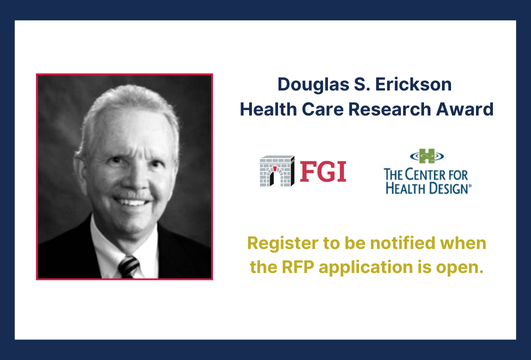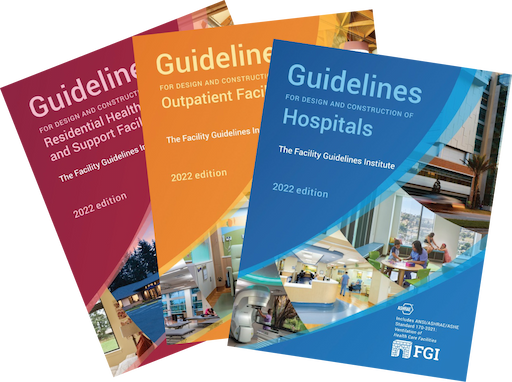Revision Process
Each edition of the Guidelines is reflective of a 4-year revision cycle guided by the work of the Health Guidelines Revision Committee (HGRC). The HGRC brings together some of the best minds in health care to debate, discuss, and revise the documents with input from the public gathered during the proposal and comment periods. Read more below about the HGRC, the revision cycle, and the public’s role.
Health Guidelines Revision Committee (HGRC)
The Health Guidelines Revision Committee is a multidisciplinary consensus body consisting of roughly 100 clinicians, administrators, architects, engineers, and representatives from authorities having jurisdiction (AHJs). Applications for HGRC membership are accepted at the beginning of each 4-year cycle.
The HGRC is subdivided into three document groups—one for each of the Guidelines documents—allowing for specific focus on hospital, outpatient, and residential facility needs. Smaller topic groups are formed at the beginning of each revision cycle to address topics identified by the HGRC Steering Committee (e.g., behavioral health, emergency conditions, infection prevention, long-term acute care facilities). Topic groups work throughout the revision cycle to consider how the defined topics are addressed across the Guidelines documents and whether or not the content needs revision.
HGRC members are responsible for reviewing and voting on all submitted proposals and comments in addition to approving the final Guidelines manuscripts before publication. FGI remains incredibly grateful for the time and dedication given by each HGRC member to maintain and improve the Guidelines documents.
The application process for HGRC membership begins in the Spring of each revision cycle. Those interested in applying should keep an eye out for announcements in the FGI Bulletin.
HGRC membership and responsibilities are outlined in the following sections of the 2026 HGRC Operations Manual:
3.4 Health Guidelines Revision Committee
The HGRC’s mission is “to create documents, using an interdisciplinary consensus process advised by research, that can be used to create an advanced, cost-effective, high-quality built environment for the health care community.”
3.4.1 HGRC membership
(a) Appointment to the HGRC
(i) HGRC members are appointed by the Steering Committee in a closed meeting at which guests are not allowed to attend.
(ii) HGRC membership is open to individuals who have expertise in patient care and/or health and residential care facility design, administration, operations, or construction or other activities that support these environments.
(iii) HGRC members shall have demonstrable experience, education, and training in fields related to health and residential care physical environments. Members’ experience shall be focused primarily on the types of facilities included in the Guidelines.
(iv) New members will not be considered during a revision cycle in progress unless a special need is determined by the Steering Committee.
(v) Each HGRC member’s term shall be limited to the four-year revision cycle. To be considered for reappointment, members must be active participants throughout the revision cycle. The Steering Committee will review attendance at meetings, preparation for meetings, voting participation, and response to requests to participate in the formal interpretation process as elements when considering reappointments to the HGRC.
(vi) Once the HGRC has been established, the name and affiliation of each member shall be made available to the public on FGI’s website.
(b) Size. The preferred size of the HGRC does not exceed 100 individuals; however, ensuring broad representation and requisite expertise is paramount and may result in a larger group.
(c) Balance/professional interest categories. Members of a single professional interest category shall comprise no more than one third of the HGRC membership. The interest categories are defined as follows:
(i) Authority having jurisdiction: Individuals who regulate the design and construction of health or residential care facilities at the local, state, or federal level, or who represent an organization responsible for accrediting health care or residential care facilities (e.g., The Joint Commission, DNV-GL)
(ii) Clinician: Individuals who have expertise in patient outcomes (e.g., doctors, nurses, infection preventionists, patient advocacy professionals)
(iii) Designer: Design professionals (e.g., architects, interior designers, contractors) who specialize in health care or residential care facilities
(iv) Engineer: Engineers with roles in health care design (e.g., construction, electrical, plumbing, mechanical)
(v) Government: Individuals who work for government agencies that oversee the health care and residential care industry (e.g., CDC, NIH, AHRQ, NIOSH, CMS)
(vi) Owner: Individuals and representatives (e.g., administrators, facility managers, safety professionals) of health care or residential care organizations
(d) Organizations and federal agencies with appointed HGRC members have the option of requesting their representative and two alternates. Organizations and federal agencies with alternates shall follow these rules:
(i) Organizations and federal agencies shall not assign more than one representative to a document group.
(ii) An alternate may vote in his/her/their assigned HGRC document, topic, and task group discussions unless the principal representative is also in attendance.
(iii) An alternate may vote in the principal representative’s stead if the principal representative is not in attendance or defers to the alternate. The principal representative and alternate shall not be permitted two votes in the same document group, topic, or task group.
(iv) The principal representative shall vote on the final ballot. An alternate is permitted to vote on the final ballot only when the principal member does not cast a vote.
(v) Organizations that choose to send an alternate to an all-hands meeting will be responsible for the alternate’s travel, lodging, and expenses for attending the meeting.
3.4.2 HGRC responsibilities. The successful creation of the Guidelines is dependent on the active participation of HGRC members. All committee members must agree to the following minimum obligations:
(a) Members are expected to contribute to the work of the groups to which they have been assigned. Members may write and submit proposals and comments on their own and on behalf of HGRC groups.
(b) HGRC members are expected to attend and participate in the three HGRC all-hands meetings and as many meetings as possible for the document, topic, and task groups on which they serve.
(i) All-hands HGRC meetings. HGRC members should be engaged in the work of the committee for the meeting’s duration. All-hands meetings may be virtual or in-person.
(ii) Document group meetings
1. Members are expected to actively participate during document group meetings.
2. Members shall notify the chair of their assigned document group of a planned absence prior to the beginning of the meeting.
(iii) Topic and task group meetings. HGRC members who have committed to serve on a topic and/or task group shall attend as many meetings of the group as possible. Members shall notify the chair of the task group of a planned absence prior to the beginning of the meeting.
(c) Conduct. Members are expected to be respectful of other members’ opinions and views. At the discretion of the HGRC chair, members who conduct themselves in a disrespectful fashion or in a manner that hinders the progress of the meeting may be removed from the meeting with cause.
(d) Members are expected to review materials prior to a meeting or conference call. Members who display evidence of not being prepared may be asked by the HGRC chair, vice chair, or document group chair to refrain from participating in the discussions.
(e) HGRC members who are asked by the Interpretations Committee for comments on an interpretation are expected to provide a response.
(f) Members are encouraged to:
(i) Invite others to submit proposals for change, review the draft manuscript, and submit comments on the draft.
(ii) Share the draft manuscript with members of relevant professional organizations to solicit their participation and feedback.
3.4.3 HGRC authority
(a) The HGRC shall have primary responsibility for the content of the Guidelines.
(b) The HGRC shall review and vote on submitted proposals to change the content of the Guidelines and comments received on the draft manuscript.
(c) The HGRC shall vote to determine whether to recommend the Steering Committee approve the final manuscripts for publication as the next edition of the Guidelines.
3.4.4 Miscellaneous
(a) Nondisclosure agreement. The Guidelines content is the copyrighted intellectual property of the Facility Guidelines Institute.
(i) HGRC members shall not record the deliberations of the HGRC conference calls or in-person meetings without permission.
(ii) HGRC members shall not communicate the deliberations of the committee during the meetings to others not on the HGRC.
(iii) HGRC members shall not present the decisions of the HGRC as final before the Steering Committee has approved the final manuscript for publication.
(iv) HGRC members shall not share final manuscripts for the next edition of the Guidelines outside the HGRC.
(v) No HGRC member shall claim to represent the views or opinions of the Health Guidelines Revision Committee in presentations, email messages, articles, or publications without express written consent from the Facility Guidelines Institute. Any email, printed material, or presentation by an HGRC member shall include the following disclaimer: “The views and opinions expressed in this presentation/article are the opinion of the speaker/author and not the official position of the HGRC or FGI.” HGRC members who write articles or create conference presentations about the Guidelines are requested to have these materials reviewed by FGI staff before submission to assure the Guidelines content and process are presented in a consistent way.
(b) HGRC member acknowledgment. HGRC members who contribute to the process per Section 3.4.2, HGRC responsibilities, shall be acknowledged in the next edition of the Guidelines.
3.5 Subject Matter Experts
At the discretion of the Steering Committee, individuals who are not members of the HGRC but who possess specific content expertise needed by the HGRC may be invited to participate in the deliberations of HGRC document, topic, and task groups.
3.5.1 Outside subject matter expert acknowledgment
(a) Invited outside participants who contribute to the HGRC revision process shall
be acknowledged in the next edition of the Guidelines.
(b) HGRC subcommittee chairs shall collect contact information from any outside subject matter experts who serve on their committees and provide it to FGI staff.
3.5.2 Outside subject matter expert disclaimer. No outside participant shall claim to represent the views or opinions of the Health Guidelines Revision Committee in presentations, email messages, articles, or publications without express written consent from the Facility Guidelines Institute. If permission is granted, the subject matter expert shall include the following disclaimer: “The views and opinions expressed in this presentation/article are the opinion of the speaker/author and not the official position of the HGRC or FGI.”
Two opportunities for public input


The Proposal Period
There are two opportunities for Guidelines users to contribute to development of the 2026 Guidelines. The first is a public proposal period from February 1 through June 30, 2023. FGI and the HGRC encourage the public to review the 2022 Guidelines documents during this time and submit proposals for any desired change to the language. A solid substantiation for the HGRC to consider is requested with each proposal.
Upon the closing of the proposal period, the 2026 HGRC will review and vote on each proposal, and accepted proposals will be incorporated into the 2026 draft Guidelines for public review.
The Comment Period
Proposals approved by the HGRC and incorporated into the draft 2026 Guidelines documents will be released for public comment from July 1 through September 30, 2024. During the comment period, FGI and the HGRC encourage the public to review the changes accepted by the HGRC as a result of the proposal period and provide input where additional changes may be needed. Please note that new proposals are not allowed during the comment period and will be held for the 2030 revision cycle. Users of the documents are also encouraged to leave supporting or opposing opinions on others’ submitted comments. At the close of the comment period, the HGRC will review and vote on all comments, after which approved comments will be incorporated into the 2026 Guidelines.
Final Vote and Publication
After all comments have been voted on by the HGRC, a final draft of the 2026 Guidelines documents will be created. HGRC members will cast final votes on the manuscripts, and FGI’s editorial team will begin the process of preparing the 2026 edition of the Guidelines for publication. Guidelines enthusiasts can expect to see digital and paperback versions of the 2026 Guidelines in April 2026.


Request Sponsorship Information
We appreciate your interest. We'll be sure to email you the sponsorship packet once the information below is submitted.
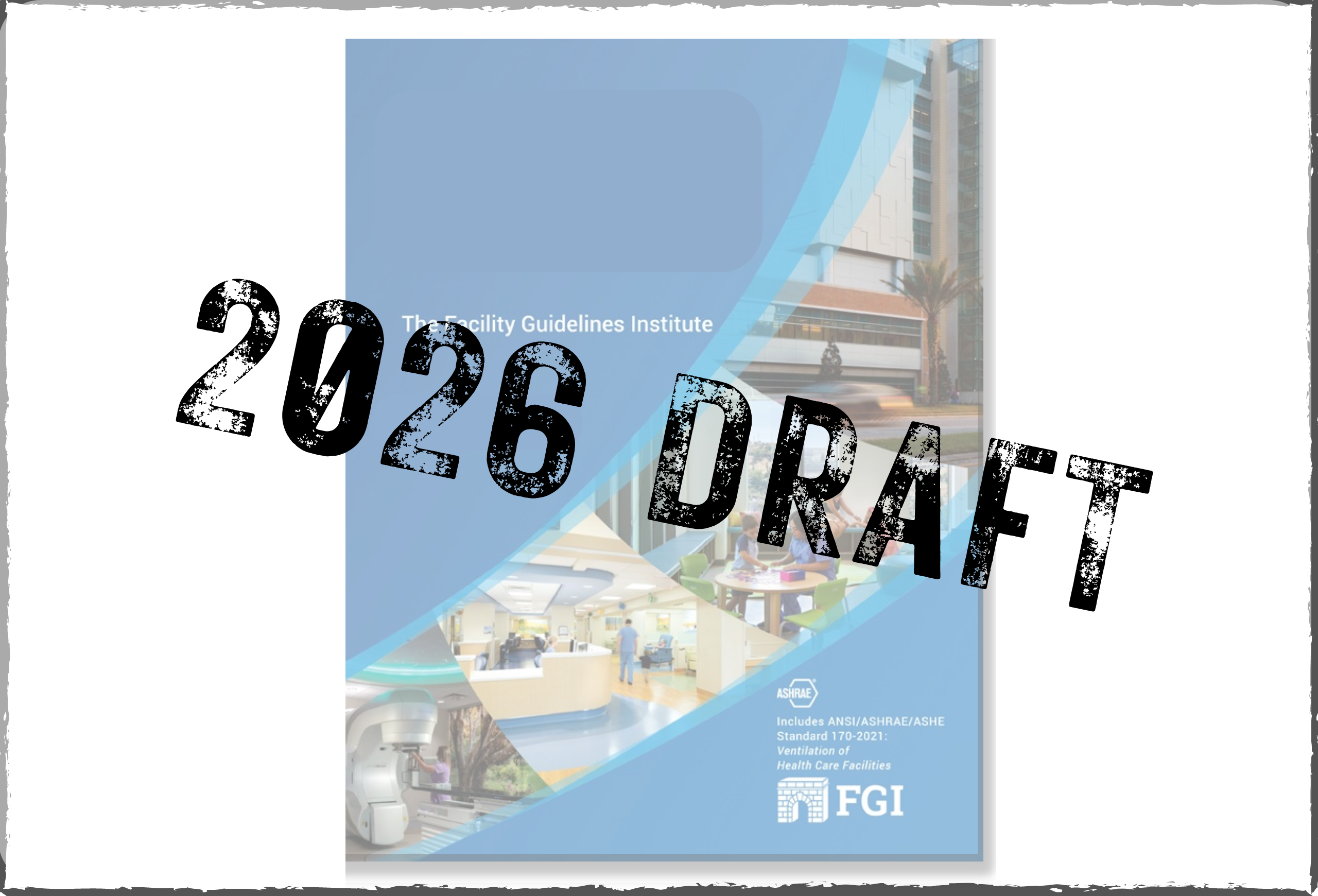
FGI Facility Code for Hospitals Draft
Refresh this page to download another 2026 draft.
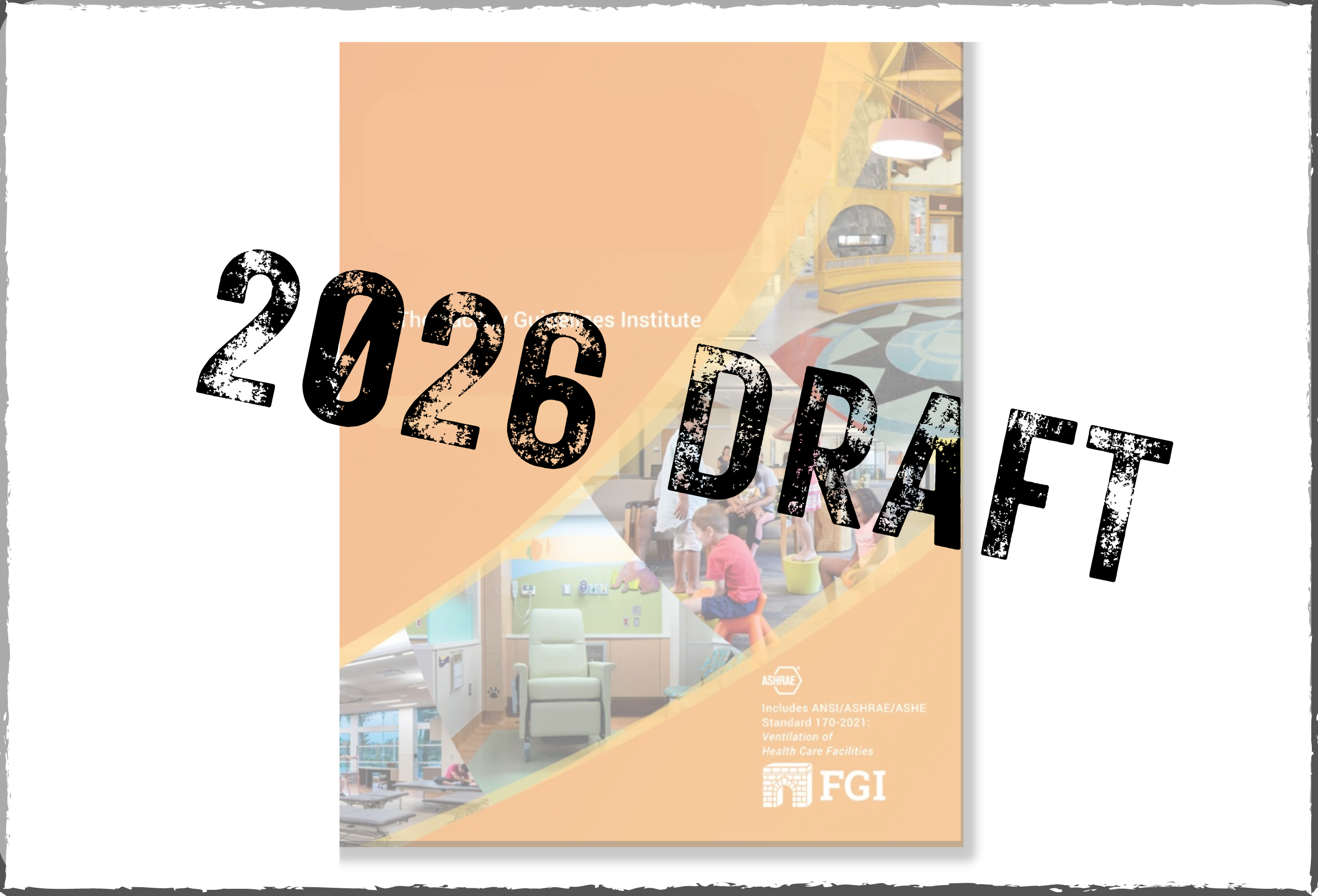
FGI Facility Code for Outpatient Settings Draft
Refresh this page to download another 2026 draft.
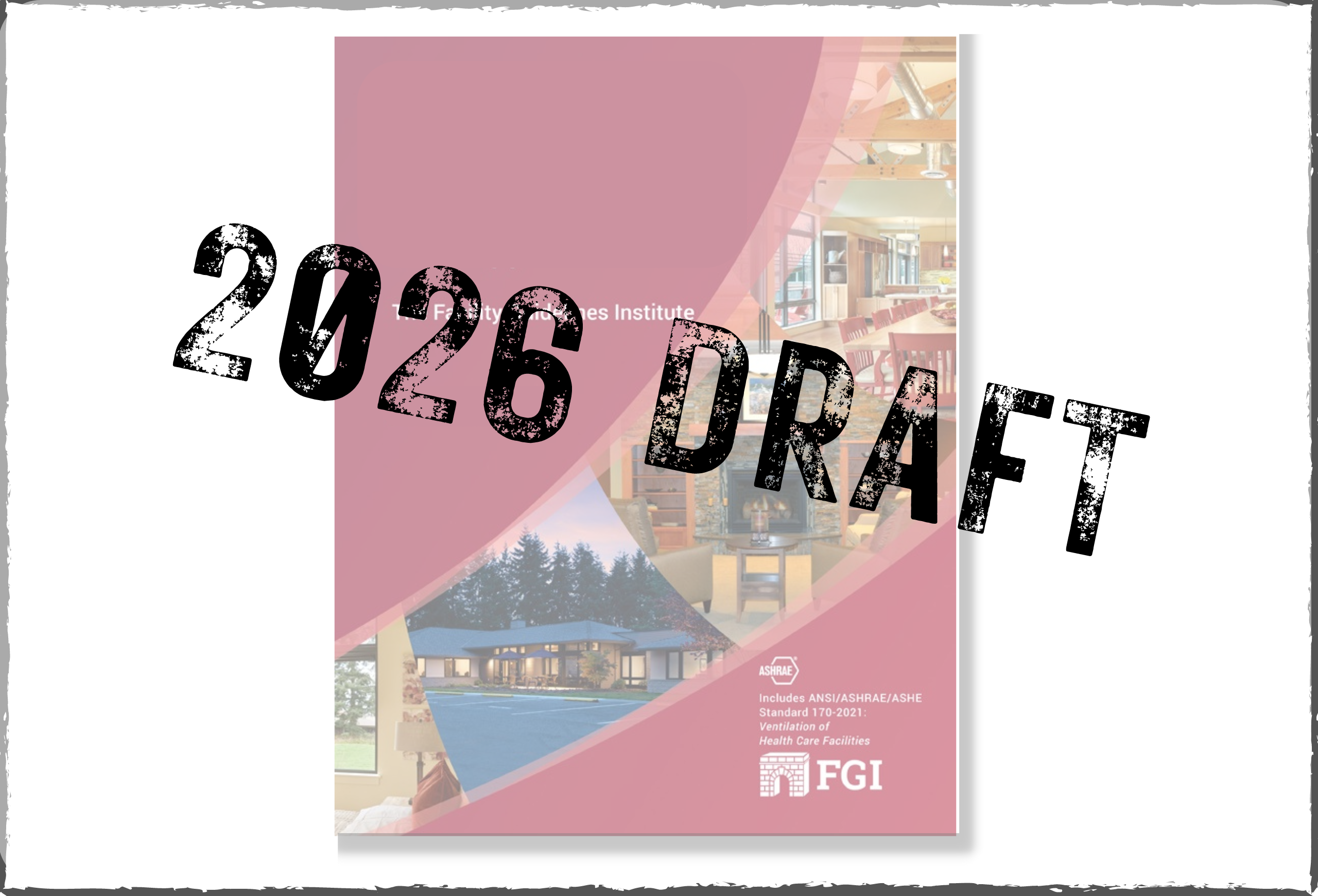
FGI Facility Code for Residential Care and Support Settings Draft
Refresh this page to download another 2026 draft.
